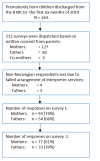Parental reports of hospital- and community-based follow-up services, self-efficacy, and symptoms of depression a few months after discharge of a prematurely born child
- PMID: 38898436
- PMCID: PMC11186226
- DOI: 10.1186/s12889-024-19079-4
Parental reports of hospital- and community-based follow-up services, self-efficacy, and symptoms of depression a few months after discharge of a prematurely born child
Abstract
Background: Many parents report the transition from hospital to home as challenging after the birth of a preterm-born child. This study investigates parental perceptions of community-based follow-up services after hospital discharge, alterations in parental self-efficacy during the early months at home, the prevalence of depressive symptoms among parents, and the relationship between these factors and both NICU experiences and children's regulative behaviors.
Methods: In this second phase of a descriptive study, 110 parents returned a digital questionnaire when their child was four months corrected for prematurity. Parents were recruited while hospitalized with their child, in one of eight Norwegian neonatal intensive care units (NICUs). Thus, the study provides insight into follow-up services across a broad geographical range. Parents' perception of self-efficacy was reported on the Karitane Parenting Confidence Scale, and depressive symptoms were evaluated with the Edinburgh Postnatal Depression Scale (EPDS). Children's regulative behavior was reported on the 6-month version of the Ages and Stages Questionnaire: Social and Emotional (ASQ: SE). Using SPSS, associations between variables were investigated in multiple regression analysis in addition to descriptive analysis. Additionally, the examination of repeated measures of parental self-efficacy involved the application of linear mixed models.
Results: Parents reported improved perception of self-efficacy from postdischarge to the children's age of four months (F (1,167) = 1233.2, p < 0.001). On average, fathers' self-efficacy improved more than that of mothers. Parents' perception of being well informed prior to discharge from hospital predicted improved self-efficacy (F [1, 29] = 10.4, p = 0.003). Reports of depressive symptoms were at a similar level as previously reported among new parents, as 10.4% of mothers and 6.7% of fathers reported EPDS scores ≥ 10 points. Parents' reports on ASQ: SE show that 15% of the children scored above the recommended cutoff score for three- to nine-month-old children. The parent-reported benefit of follow-up services showed considerable variation. The importance of specific knowledge about prematurity among public health nurses and physicians was frequently mentioned, and public health nurses were perceived as coordinators and mediators of various services.
Conclusions: Parents reported improved self-efficacy, and depressive symptoms at similar levels as new parents in general, a few months after discharge from hospital. Childrens' regulatory behavior were reported at levels comparable with term-born infants.
Keywords: Follow-up services; Parental mental health; Parental self-efficacy; Preterm infants.
© 2024. The Author(s).
Conflict of interest statement
The authors declare no competing interests.
References
-
- Shillington J, McNeil D. Transition from the neonatal intensive care unit to home: a Concept Analysis. Advances in neonatal care. Volume 21. Lippincott Williams & Wilkins; 2021. pp. 399–406. 5. - PubMed
-
- Moberg KU, Handlin L, Petersson M. Neuroendocrine mechanisms involved in the physiological effects caused by skin-to-skin contact - with a particular focus on the oxytocinergic system. Infant Behav Dev. 2020;61:N.PAG-N.PAG. - PubMed
Publication types
MeSH terms
LinkOut - more resources
Full Text Sources
Medical


